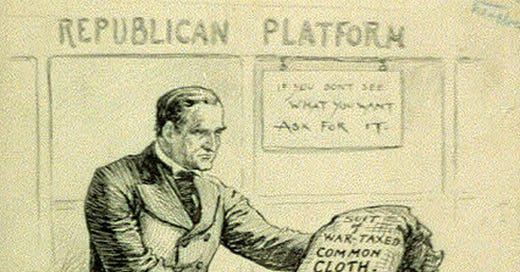It's not about economics, it's about power
Krugman is right: the economic case for "Liberation" tariffs is non-existent. But that misses the point.
Paul Krugman is correct on economics but the "liberation” thesis has nothing to do with any utilitarian economic goal. Quite the opposite. It's a theory of power. Specifically, it’s a theory of power in which tariffs are used to create an “imperial preference” discriminatory trading structure — a reversal of the “most-favored nations” system in place since the creation of the GATT at the end of WWII — which is “weaponized” to produce open-ended concessions, from every nation on earth, to the person of Trump.
This is not a macroeconomic project, it is an imperial project. It has nothing to do with economic efficiency, it is using the power of the US economy to build a tributary system for the personal gain of the Trump family, which is being presented to the world as monarchical. Trump is using tariffs — his primary tool of authority that does not require Congress or the Fed to operate — to establish himself as an emperor over a global economy that is explicitly organized around white supremacy. It is a protection racket at world scale.
As prophesied in Battlestar Galactica, “all this has happened before, and it will all happen again”. (Unfortunately for all, it should’ve added.) There is nothing new about this (comic below from Harper’s Weekly in 1888). The theory of power guiding the Trump admin has been discredited whenever it has been tried (Trump loves the uneducated). It was central to the McKinley administration — McKinley was known as the “Napoleon of Protection” — who emphasized the need for “reciprocal trade” on a bilateral basis. McKinley was also arguably the United States’s most ambitious imperialist, which is why he is Trump’s favorite president other than Andrew Jackson, the US’s chief génocidaire. (McKinley was eventually assassinated by a Luigi Mangione type of figure.)
It has been discredited both economically and geopolitically. To understand why, let’s not dismiss the theory as nonsense, but instead consider how it furthers Trump’s ultimate agenda.
The theoretical claim is that tariffs give Trump power over Canada, which he can use to coerce them into (for now) stopping fentanyl trafficking into the US via militarizing their side of the border at their own expense. The theory is that tariffs give Trump power over Europe, so they will "do a deal" to buy more American and thus "pay the cost" of the tariffs via direct purchases.
The theory is that Trump has and should have unchecked power over the domestic and global economy, and this power should be used… however Trump feels like using it. It is a theocratic theory: empires need emperors, and emperors declare themselves gods.
“Liberation Day” is a political slogan, not an economic one. This is not “Growth Day”. It’s not “Jobs Day” or “Infrastructure Week”. It's a claim about the nature of power, the uses of power, the instrumentality of power: that is belongs to Trump and Trump alone. The theory is that Trump is a master deal-maker and tariffs are a point of leverage in deal-making, i.e. they are a power resource like bombs are a power resource. The theory is that Trump can isolate countries and force them to capitulate one by one. The theory is that Trump understands zero-sum politics better than anyone else in the world.
The theory is wrong because power in the global economy is primarily structural, not instrumental. Thus, Trump is doomed to fail, and fail miserably. Probably more miserably than any leader in US history has ever failed. But that will have to wait for another post.





The slogan "Liberation Day" can be seen as somewhat ironic (in the loose, colloquial sense of that word) since the 18th-cent. and later proponents of free trade themselves aimed to liberate states and peoples from the constraints of mercantilist policies, as G. Gerstle points out in a passage I quote in a v. short (and admittedly rather simplistic) post at my blog. After I wrote the post I pulled my old Samuelson textbook, which happened to be at hand, off the shelf, but that's another story.
https://surmisesandsuspicions.wordpress.com/2025/04/06/a-note-on-the-history-of-certain-economic-ideas/